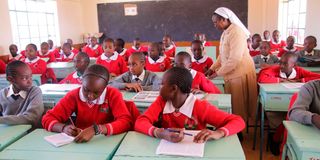Schools struggle as Sh9bn for JSS yet to be released

A teacher takes Grade Seven learners through their studies at Tetu Girls Junior Secondary School in Nyeri County on January 31, 2023.
One month after Grade 7 learners reported, schools are yet to receive the Sh9.6 billion capitation funds for first term, with head teachers complaining that the delay is affecting their operations.
Headteachers who spoke to the Nation complained that their work is complicated by the fact that Ministry of Education guidelines for the implementation of junior secondary school (JSS) stipulated that the new section operates different bank accounts from the primary section.
They, therefore, fear that using money meant for primary school to run the JSS, which is hosted in the same compound, might raise audit queries.
The Ministry of Education has announced that each learner in a public school has been allocated Sh15,000 per year, to be disbursed in three tranches of 50, 30 and 20 per cent. Of this amount, Education Cabinet Secretary Ezekiel Machogu has explained that Sh4,000 will be used for infrastructure development, especially the establishment of science laboratories.
According to estimates presented last week for consideration in the supplementary budget estimates for the fiscal year 2022/23, the ministry will require Sh5.7 billion capitation for second term.
Tuition materials
Learners in primary school get an annual capitation of Sh1,420. According to ministry records, there are 7,630,772 learners in primary school. Learners in secondary school receive an annual capitation of Sh22,244.
The chair of the Kenya Primary Schools Heads Association Johnson Nzioka confirmed that the money has not yet been wired to school accounts. He said that schools have immediate needs like the purchase of tuition materials while others have increased enrolment in Grade 7 owing to new students from feeder schools that failed the ministry requirements for hosting JSS. Mr Nzioka said many of these learners are from small private schools, especially in urban areas.
Basic Education Principal Secretary Belio Kipsang has warned head teachers against charging levies for learners in Grade 7, saying the government will cater for their education. This followed complaints by parents that some schools were charging as high as Sh8,000.
“You’re directed that no public school charges unauthorised levies such as admission fees, desks and lunch unless the school has a previous authorised lunch programme for the whole school,” Dr Kipsang said in the circular.
The delay of the funds is just one of the problems dogging the implementation of JSS. Headteachers complain that the delivery of textbooks has been poor.
“We don’t have textbooks. We only received for agriculture and Kiswahili. I only rely on the curriculum designs to teach the other subjects,” a teacher from Nairobi County said. There are 12 subjects in JSS.
Schools are also struggling with a shortage of teachers for JSS. The Teachers Service Commission recently recruited 30,000 teachers for JSS but schools received between one and three new teachers. There are more than 23,000 public primary schools in Kenya. This has forced teachers in the primary school section to take up lessons for JSS.
Some 1,253,577 learners sat the inaugural Kenya Primary School Education Assessment (KPSEA), but the Education ministry is yet to give data on how they are distributed in private and public schools. There are fears that thousands of learners will drop out since they have not reported to school. Interestingly, the ministry’s estimate for Grade 7 learners is 1,272,830, according to a report presented last week to the Education Committee of the National Assembly. The figure is 19,253 higher than the actual number that sat KPSEA.
During the presentation of the report, Dr Kipsang complained that the funds allocated for co-curricular activities in schools are inadequate.
“The state department requested for an additional Sh550 million to effectively manage these activities. This request has not been provided in the Supplementary Budget proposal,” he said.





